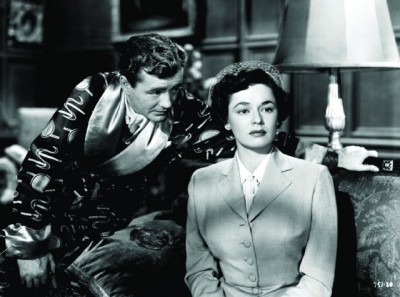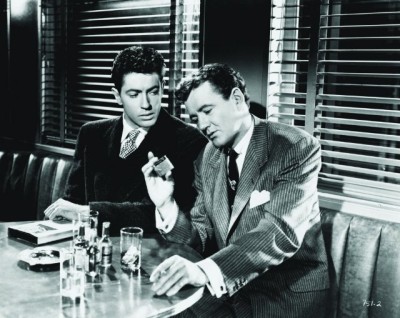
What makes Strangers on a Train such a memorable work from a great filmmaker? Why does a fairly small production without any major stars continue to fascinate when some of Hitchcock’s big pictures — Rebecca (1940) and The Man Who Knew Too Much (1956) come immediately to mind — have kind of fallen by the wayside? Is it the convoluted plot in which an innocent man finds himself involved in a bizarre murder scheme that he never agreed to? Is it the fact that the film’s dark humor seems peculiarly modern? Might it even have something to do with Hitch casting the gay Farley Granger as the straight hero and the straight Robert Walker as the gay villain? (Something the general public couldn’t have known in 1951.) All these elements probably play into it, but I think it has a great deal to do with the fact that it’s so much a “director’s picture” — something we can better appreciate in our movie-savvy age. Everywhere you turn in Strangers on a Train, you find Hitchcock doing something refreshingly creative with the way the film is made — whether it’s the depiction of the murder, the famous tennis match, the out-of-control merry-go-round climax — there’s always something new and clever on the screen, and it’s all endlessly watchable.

From the original review: Perhaps none of Alfred Hitchcock’s 1950s films are quite as intense as Strangers on a Train (1951). There are arguably better films from that period, but none are more effective at generating the atmosphere that gained Hitchcock the title “Master of Suspense.” The story is certainly a classic one — even serving as the premise for Danny DeVito’s Throw Momma from the Train (1987). Two men meet by chance on a train where one of them puts forth an idea for the perfect pair of murders. Supposing that Bruno Anthony (Robert Walker) committed a murder that would benefit Guy Haines (Farley Granger) in a manner that afforded Guy an airtight alibi, then Guy could do the same for him. Because the victims would have no connection of any kind to their killers, the likelihood of them being caught would be slim. That’s the crux of the story, but it doesn’t take into account the fact that Bruno is quite capable of agreeing to the proposal for both of them, expecting Guy to carry out his end of a bargain that he didn’t really make.
Full review: http://www.mountainx.com/movies/review/strangers_on_a_train
The Hendersonville Film Society will show Strangers on a Train Sunday, June 16, at 2 p.m. in the Smoky Mountain Theater at Lake Pointe Landing Retirement Community (behind Epic Cinemas), 333 Thompson St., Hendersonville.




Robert Walker’s performance is especially convincing and chilling. Maybe the cast isn’t big name but they do a bang-up job. This is one of my favorite Hitchcocks. It was probably too dark to be well appreciated in that era dominated with Doris Day and Jimmy Stewart pictures,
Yes, the era has a certain bland quality.
Seems like a disproportionate amount of the big Hollywood pictures of the time were adaptations of novels or plays.
That poses a kind of challenge to see whether or not it’s true. I don’t normally think in terms of whether a movie was an adaptation or an original, and I’m not sure it would explain blandness.